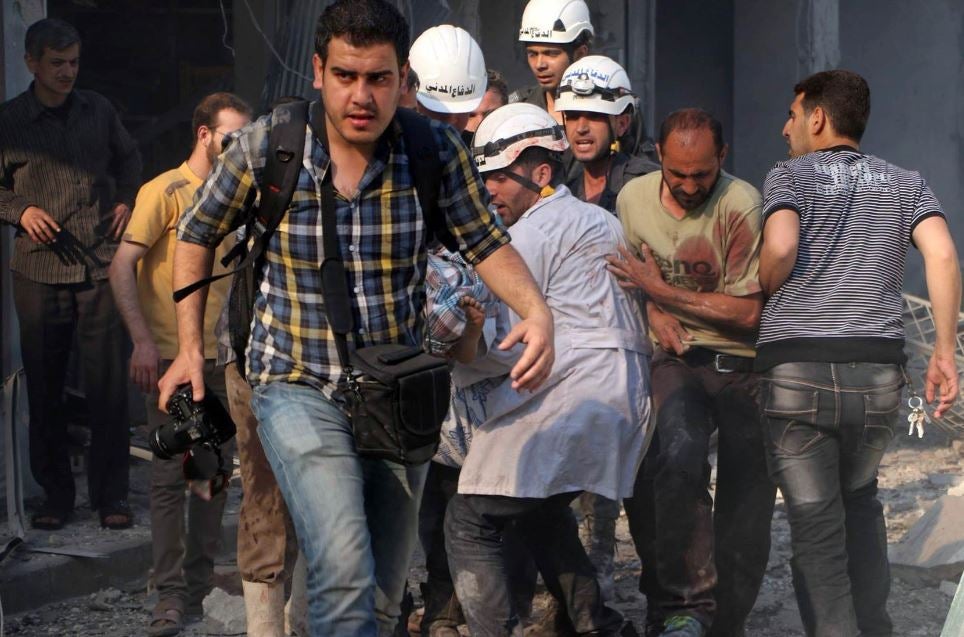The local journalist shining a light on Aleppo
Zein al-Rifai is a 28-year-old freelance photographer and video-journalist from Aleppo. He is a Rory Peck News finalist for his coverage of daily life in the rebel-held area of the city – the former economic capital of Syria – for AFPTV.

Your support helps us to tell the story
From reproductive rights to climate change to Big Tech, The Independent is on the ground when the story is developing. Whether it's investigating the financials of Elon Musk's pro-Trump PAC or producing our latest documentary, 'The A Word', which shines a light on the American women fighting for reproductive rights, we know how important it is to parse out the facts from the messaging.
At such a critical moment in US history, we need reporters on the ground. Your donation allows us to keep sending journalists to speak to both sides of the story.
The Independent is trusted by Americans across the entire political spectrum. And unlike many other quality news outlets, we choose not to lock Americans out of our reporting and analysis with paywalls. We believe quality journalism should be available to everyone, paid for by those who can afford it.
Your support makes all the difference.Before the start of the Syrian uprising in March 2011, I was a student studying French literature at the University of Aleppo. I then joined the protests against Bashar al-Assad's dictatorship.
When the peaceful demonstrations started, we used to film them with our phones and post the scenes on social media for the rest of the world to see. At the time there was no independent press in Syria – no independent reporters on the ground – so for us it was the only way to convey these scenes to the rest of the world. I was detained several times but never jailed.
After the Free Syrian Army entered Aleppo in mid-2012, media workers started acquiring more freedom, and international news outlets made their way to the city. That's when I started to learn about journalism. I became a guide for foreign correspondents and I was able to follow them around as they worked on the ground.
In late 2012, a group of friends and I had the idea to create a media centre to film and document the protests. We wanted to give the world an account of the revolution from the perspective of young Syrians at the heart of it, so we created the Aleppo Media Centre.
The centre quickly became a meeting point for foreign and Arabic journalists and a place where Syrian citizens could be trained in the basics of journalism. As we started spreading news of the revolution to the world, it was also our way to offer an alternative to the news provided by the regime-controlled media.
I began to film the protests, military operations, and scenes of everyday life in and around Aleppo. I documented the air strikes on civilian areas, people's suffering and the massacres that were being committed on a daily basis.
I began working for Syrian opposition TV channels like Orient News and Syria Tomorrow, and I contributed to Al-Jazeera before joining AFP in late 2013 as a freelance photographer. The year after that, I started working with AFP's video department. Since then, I've filmed all aspects of life in Aleppo, from the fighting to the humanitarian crisis affecting the city.
Life in Aleppo does not resemble life anywhere else in the world. My city has been ripped apart by war and has seen things that defy the imagination. Words can’t do them justice. It's a city full of love and war, childhood and death, pain and suffering. It's considered one of the most dangerous cities in the world as it gets bombed every day with barrels of explosives and slaughtered with a knife by Islamic State in the eastern countryside. I've seen the lives of innocent people destroyed by death and disability. Houses are no longer safe in Aleppo. There is nowhere left to hide. And no one knows how long it's going to last as the international community turns a blind eye to these forgotten tragedies.
A few months ago I suffered an injury to my feet and other parts of my body while filming fighting between regime and opposition forces in the northern countryside of the city. Because of the scarcity of doctors and medical equipment, I had to be transferred to Turkey for treatment, where I am still, recovering from my injuries. I hope to heal quickly so I can return to Aleppo and continue to show the world how much suffering goes on there.
I hope one day to see smiles back on the faces of the country's children after Assad is overthrown and the Islamic State group is disposed of. Only then can we build a free and peaceful Syrian state.
Join our commenting forum
Join thought-provoking conversations, follow other Independent readers and see their replies
Comments